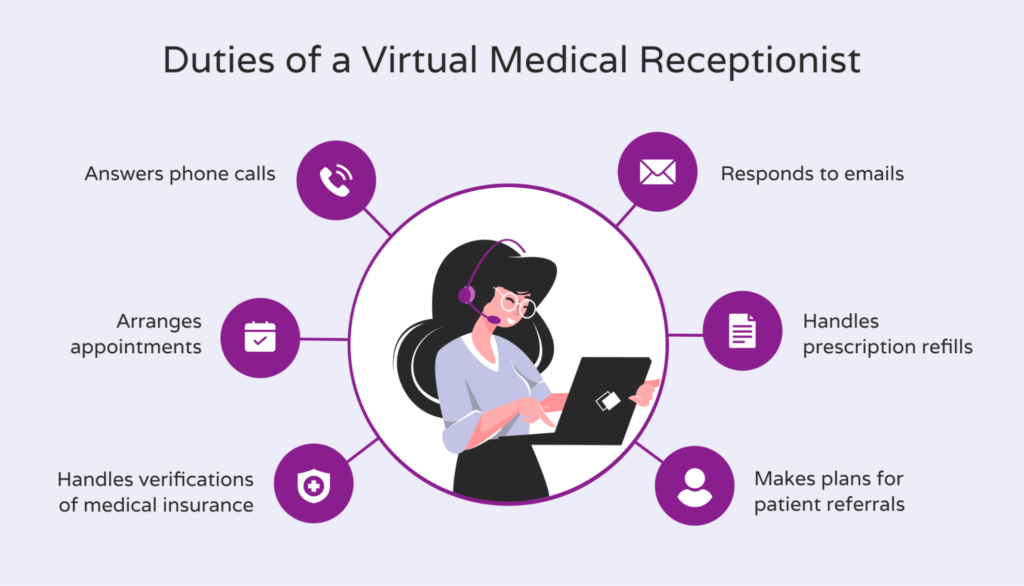In today’s fast-paced healthcare environment, medical practices continually seek ways to enhance efficiency while maintaining high levels of patient care. One effective solution that has gained traction is the implementation of virtual medical receptionists. These professionals handle front-office tasks remotely, allowing medical facilities to streamline operations, reduce administrative costs, and focus more on patient interaction.
The Role of Virtual Medical Receptionists
Virtual receptionist for medical practice serve as the first point of contact for patients, managing various essential functions that traditionally occupied the time of in-house staff. Their responsibilities typically include:
- Answering Calls and Scheduling Appointments: Virtual receptionists manage incoming calls, providing patients with the information they need to schedule appointments at their convenience. This improves patient satisfaction and helps practices maintain an organized schedule.
- Patient Inquiries: Receptionists respond to routine inquiries regarding office hours, services offered, and insurance issues. Their ability to provide real-time answers is crucial for maintaining seamless communications.
- Confirmations and Reminders: They can send out appointment confirmations and reminders, answering patients’ questions before their visit. This proactive communication reduces no-show rates, optimizing overall scheduling.
- Collecting Patient Information: When patients call to book appointments, virtual receptionists gather necessary information directly into the practice’s management software. This helps ensure that patient records are up-to-date and accurate.
- Handling Document Requests: They can facilitate requests for medical records and other essential documents, providing a crucial service that streamlines the administrative burden on medical practices.
- Billing Inquiries and Insurance Verification: Virtual receptionists can assist with basic billing inquiries and guide patients through the insurance verification process, alleviating one of the healthcare administration’s more complex aspects.
Benefits of Employing Virtual Medical Receptionists
Cost-effectiveness
One of the most significant advantages of integrating virtual receptionists into medical practices is the cost savings. Traditional receptionists require salaries, benefits, and other employee-related expenses. In contrast, virtual receptionists are often contracted on an as-needed basis or through a flat monthly fee, allowing practices to reduce overhead costs while still getting comprehensive support.
Flexibility and Scalability
Virtual receptionists provide practices with the flexibility to scale their operations according to patient demand. Additional support can be added during busy periods, while costs can be adjusted accordingly during slower periods. This adaptability makes it easier for practices to manage fluctuating patient volumes without the hassle of hiring and training additional staff.
Enhanced Patient Experience
Virtual receptionists handle patient inquiries promptly and efficiently, improving patient satisfaction. The quick resolution of questions and smooth appointment scheduling create a positive first impression, which is crucial for retention and referral rates. Moreover, patients appreciate the convenience of receiving reception services beyond standard office hours, leading to a more accessible healthcare experience.
Focus on Patient Care
Healthcare providers can allocate more time to direct patient care by delegating administrative responsibilities to virtual receptionists. This shift allows clinicians and medical staff to concentrate on delivering high-quality healthcare, fostering stronger patient-provider relationships, and enhancing overall treatment outcomes.
Improved Workflow and Organizational Efficiency
Virtual receptionists streamline workflow using specialized medical practice management software to manage appointments and patient interactions. These systems often come with integrated features that allow easy access to patient records, leading to fewer administrative errors and better organization. This efficiency dramatically reduces the administrative burden on in-house staff and contributes to a more effective practice environment.
24/7 Availability
One of the standout features of virtual medical receptionists is their ability to provide support around the clock. Many practices benefit from coverage during evenings and weekends, catering to patients who may only be available outside of traditional office hours. This consistent availability ensures that patient needs are met whenever they arise.
Choosing the Right Virtual Medical Receptionist Service
When selecting a virtual medical receptionist provider, practices should consider several key factors to ensure they choose the right partner:
Industry Experience
Select a provider with a proven track record and experience in the medical field. Virtual receptionists must understand medical terminology, protocols, and the intricacies of patient scheduling to manage a healthcare environment effectively.
Training and Compliance
Ensure that the service provider offers comprehensive training for their staff, particularly regarding HIPAA compliance and patient confidentiality. This adherence to regulations is vital for protecting sensitive patient information and maintaining trust.
Technology Integration
The virtual receptionist service should be compatible with the practice’s existing management software and tools. Smooth integration allows for seamless data transfer and improved patient care management.
Scalability of Services
Consider whether the provider can scale their services as the practice grows. A good provider should offer flexible solutions tailored to the evolving needs of the practice.
Customer Support
Assess the level of customer support the provider offers. A robust support system ensures that any issues or concerns can be quickly addressed.
Testimonials and References
Finally, testimonials and case studies from other medical practices using the service should be reviewed. These insights can provide a clearer picture of the benefits and drawbacks of the provider’s services.
Conclusion
The adoption of virtual medical receptionists represents a significant step towards modernizing administrative processes in healthcare practices. By enabling facilities to streamline operations, enhance patient interactions, and reduce costs, DocVA virtual receptionists offer a practical solution that meets the needs of busy medical practices. As the healthcare landscape continues to evolve, choosing to integrate virtual reception services may not just be an advantage but a necessity for those looking to thrive in an increasingly competitive environment.By prioritizing patient care and operational efficiency, medical practices can ensure they deliver the best possible service while managing the complexities of modern healthcare.



